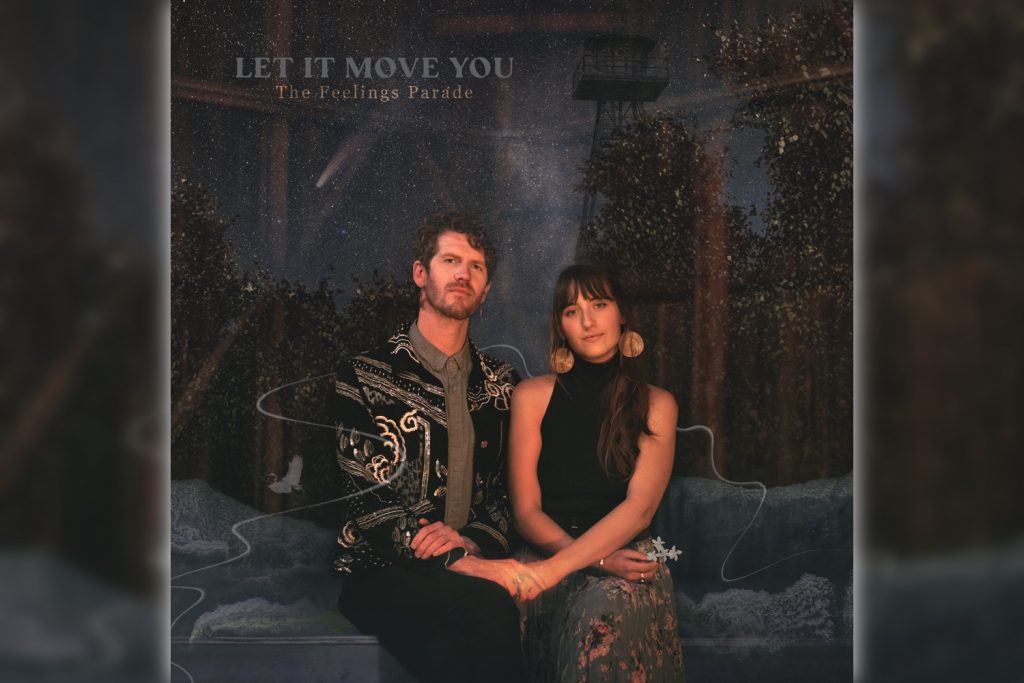Album Review: The Feelings Parade Battles Uncertainty with Grace on ‘Let It Move You’
By Rey Roldan

It’s difficult to talk about The Feelings Parade’s new album Let It Move You without addressing the shocking seizure and brain surgery that Morgan Bolender endured while recording it. It’s also impossible to ignore, because peppered throughout the album are nonmusical interludes featuring soul-bearing honesty: voice memos, recordings from doctor’s offices… thoughts and raw feelings about how this is affecting the pair and those around them during the recording process. Understandably, themes of mortality, hopelessness, political division, and internal strife haunt the lyrics like a specter, constantly reminding us of life’s perpetual uphill climb.
But Let It Move You isn’t a depressing listen. Quite the opposite, in fact. Gentle and lilting, while sometimes exuberant and joyful, it keeps the mood light and airy with ambient guitar tones, sustained Hammond, and heavenly harmonies, even though the unwavering honesty in the album’s narrative can sometimes feel challenging or bleak.
Positing itself between the self-aware reflection of indie rock artists like Cat Power or Rilo Kiley and the breezier, vintage tones of Simon & Garfunkel, the queer duo (both Bolender and her musical/romantic partner Scott Ferreter identify as such) fuses the tenets of modern folk with the easiness of 70s AM radio. This construction allows their music to be lush while still embracing vulnerable intimacy. Though there are over 30 musicians who play throughout, Let It Move You never feels crowded or claustrophobic. Instead, it reads more like a confessional, with feelings and fears laid bare, spurred on by Bolender’s medical anxiety as well as the COVID pandemic that was raging just as the album took shape. This emotional torrent of helplessness helps fuel the honest tone of each of the tracks.
The album opener “The Tides” tackles perils of queer identity and the repercussions that come with open admission. Losing one’s sense of belonging is a peril that offers little to no comfort (“Home isn’t safe anymore/This life will rip you to bits to get to the truth that’s inside”) and will swallow you whole if you’re not careful. With care and acceptance, however, an escape can be drawn, “…when you give into the spin/And get taken by the tides.”
Exploring the insecurity of being female-bodied in a world that is oppressive and downright dangerous, Bolender’s unease-inducing “Too Much” tackles the vulnerability of inhabiting a body in which you don’t feel safe, “looking over my shoulder/Tight knuckles clutching keys.” Enveloped in fuzzy washes of violins and pedal steel, Bolender weighs the comfort of existence with the need to “armor up or disappear,” articulating a universal survival tactic that transcends gender, speaking to the struggles that plague queer and BIPOC in unsafe (or uncomfortable) environments.
Accompanied by the richness and warmth of gentle, acoustic percussion, “Loose Boards” recalls Laura Marling and The Weepies as it sifts through communication dynamics that plague couples, trying to find balance within their personal insecurities.
By building a strong indie folk foundation with sturdy song structures and topping it off with soaring, hair-raising harmonies, Bolender and Ferreter have crafted an album with heavy subject matter that miraculously avoids feeling weighed down or overly preachy. All the while, they cover mortality (“A Lot to Hold”), avoidance of grief (“Time for Tea”), and the persistence to keep moving forward (“Wild Raging Rivers (How to Swim)”). They also find time to celebrate nature on the soothing, rhapsodic “Come Home To Me” and champion when love wins on the appropriately titled “Oh Momma” that Ferreter tenderly sings, recognizing the beauty of family and the joy it brings.
While the interludes can initially feel intrusive, especially when confronted with a topic as jarring as the mysterious growth in Bolender’s brain, “about the size of a marble,” or the voice message that Ferreter left her while she was being rushed into surgery, they end up serving dual purposes. Being invited into their joint experience of such a deeply personal emergency creates a loose narrative that ties the songs together and, taken as a whole, portrays a sense of unity through chaos and fear. It’s this comforting embrace that cradles the listener – queer or otherwise – into knowing that, while the world may be oppressive and downright dangerous, you can either fight or flee. “The pain in your heart, that’s the truth moving through/Will you stomp it down, or let it move you,” they sing in “A Lot to Hold.” With the challenges posed throughout the album, their answer for you is crystal clear.
It’s embarrassing to say that Rey Roldan has been writing about music since 1988. He’s written for dozens of publications such as American Songwriter, The Aquarian Weekly, MeanStreet, Cake, Boston Rock, Synthesis, and was editor of a handful more, like The Improper Bostonian, Fromage: Not for the Lactose Intolerant, Honey, and Tempest. These days, he makes his dosh being a publicist by day and a music writer by night. He resides in Weehawken, NJ with his dog.